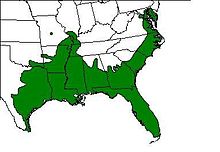American green tree frog
- For another species commonly called Hallowell's tree frog, see Hyla hallowellii.
| American green tree frog | |
|---|---|

| |
| Scientific classification | |
| Domain: | Eukaryota |
| Kingdom: | Animalia |
| Phylum: | Chordata |
| Class: | Amphibia |
| Order: | Anura |
| Family: | Hylidae |
| Genus: | Dryophytes |
| Species: | D. cinereus
|
| Binomial name | |
| Dryophytes cinereus (Schneider, 1799)
| |

| |
| Synonyms[3] | |
| |
The bilineated frog, American green tree frog, North American tree frog, green tree frog, marsh tree frog, northern green tree frog, cinereous frog, Carolina hyla, banded hyla, Carolina tree frog, Hallowell's tree frog, or Miller's tree frog (Dryophytes cinereus) is a frog that lives in the North America. It lives in the southeastern United States, from Illinois south to Florida and west to Texas. Human beings have also brought it to Puerto Rico.[1][3]
Appearance[change | change source]
This frog has a pointed snout. It has two rows of vomerine teeth. Some fo these frogs have no stripes, but most have one yellow and white stripe down each side of the body. These frogs have yellow spots.[1]
Home[change | change source]
This frog lives in swamps, marshes, sloughs, and the edges of lakes where grass grows in the water.[1]
Threats[change | change source]
This frog is not endangered but there are fewer of them than there were because human beings change the places where they live. Human beings cut down trees for logging and build artificial lakes and ponds. Also, human beings brought the Cuban tree frog to the places where the American green tree frog lives.[1]
Salt[change | change source]
Most amphibians die if they try to swim in seawater, but the American Green tree frog can live in water that has some salt. Scientists have found that the frog uses the chemical glycerol to do this. They also only stay tadpoles for a short time.[1]
References[change | change source]
- ↑ 1.0 1.1 1.2 1.3 1.4 1.5 Kevin Gin (May 9, 2001). "Hyla cinerea: North American Green Treefrog, Green Treefrog Subgenus: Dryophytes". Amphibiaweb. Retrieved December 29, 2021.
- ↑ IUCN SSC Amphibian Specialist Group (2021). "American Green Treefrog: Dryophytes cinereus". IUCN Red List of Threatened Species. 2021. The IUCN Red List of Threatened Species: e.T55449A118978218. doi:10.2305/IUCN.UK.2021-3.RLTS.T55449A118978218.en. Retrieved December 29, 2021.
- ↑ 3.0 3.1 "Dryophytes cinereus (Schneuder, 1799)". Amphibian Species of the World 6.0, an Online Reference. American Museum of Natural History. Retrieved December 29, 2021.

